
To the shock of most consumers who mistakenly believe that cows, pigs, and chickens are protected from mistreatment, chilling acts of neglect and abuse are routinely allowed to continue behind the walls of factory farms and slaughterhouses. Every year in the U.S., nearly ten billion farmed animals are subjected to crowded living conditions, painful mutilations, traumatic transports, and inhumane deaths.
Today, not a single federal law exists that provides protection to animals raised for food during their lives on the farm. Shockingly, you can cram a farmed animal in a cage so small that they can't turn around (battery-cages, veal crates, farrowing stalls), you can rip off their body parts without pain killers (castration), you can starve them (forced-molting), and you can deny them access to veterinary care.
Common Farming Exemptions allow states to get away with using battery cages, veal and gestation crates, debeaking, dehorning, tail docking, castration, branding and beak searing without anesthesia, forced molting, force-feeding (foie gras), skinning, dismemberment, suffocation, scalding, gassing, grinding up, and withholding veterinary care.
In food production, animals are turned into mere "food-production units," "crops," "grain-consuming animal units," and "bio-machines." Chickens, pigs, turkeys, cattle, and other animals are subjected to genetic manipulation, severe overcrowding, and intensive confinement in order to produce the most meat, milk, and eggs at the cheapest prices. The animals are denied wholesome foods and instead are given rations that can include garbage, manure, industrial byproducts, and even the ground-up remains of their own species. They suffer routine mutilations, inadequate shelter and veterinary care, and cruelty during handling, transportation, and slaughter.
Since childhood, most Americans have been taught and conditioned to view certain animals as things--a hamburger, a chicken nugget, a fur coat--a means to an end--a something instead of a someone. As long as we regard other creatures as our property to be bought and sold, to be owned or mastered, to be slaughtered for fashion or because we like the taste of their flesh--animals will continue to be exploited and suffer needlessly, and we will continue to distance ourselves from our own humanity.
What Can We Do?
We need to focus on attacking the problem at its roots--rather than merely addressing its symptoms. To be effective in the long term, we must work to create a society that respects all of its members, including the weakest, most vulnerable, and those without a voice--the animals. Adopting a vegan or vegetarian diet is an essential first step toward putting this commitment and vision into practice. The simple act of one person adopting a vegan or vegetarian lifestyle prevents the suffering and death of thousands of animals.
Like all markets, the food industry is driven by consumer demand. As demand for the flesh, skin, milk, and eggs of animals declines, so too will the number of animals subjected to the grim realities discussed in this article. Regardless of what path we choose in fighting the injustices against animals--whether it is writing letters to your representatives, changing your diet, or educating others about these issues--it is essential that we take action now. The system of animal exploitation won't change unless we make it change.
Source: "Compassionate Living" published by Mercy for Animals (Spring/Summer 2007 issue) and "A Primer on Animal Rights" by Kim W. Stallwood, Editor




No comments:
Post a Comment